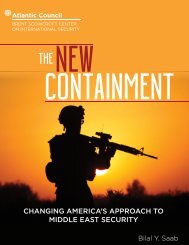POLITICS GOVERNANCE STATE-SOCIETY RELATIONS
Politics_Governance_and_State-Society_Relations_web_1121
Politics_Governance_and_State-Society_Relations_web_1121
Create successful ePaper yourself
Turn your PDF publications into a flip-book with our unique Google optimized e-Paper software.
<strong>POLITICS</strong>, <strong>GOVERNANCE</strong>, AND <strong>STATE</strong>-<strong>SOCIETY</strong> <strong>RELATIONS</strong><br />
spreading from within and without are embracing<br />
whomever they believe can provide order and<br />
security—even at the cost of accountability, human<br />
development, or basic human rights.<br />
The collapse of security and the collapse of<br />
authority in the Middle East since 2011 are the twin<br />
forces now driving the region, leaving both its<br />
population and outside actors to choose between<br />
a future governed by renewed authoritarianism or<br />
by violent extremism. Those advocating for one of<br />
these options argue that the fact, or the amount,<br />
of governance is more important than its quality.<br />
However, neither of these options offers a stable<br />
solution for a disordered region, and neither offers a<br />
prospect of a more promising future for the region’s<br />
beleaguered people. The seemingly dichotomous<br />
choice between these two dysfunctional options<br />
highlights the imperative for those concerned with<br />
Middle Eastern stability to delineate, enable, and<br />
then drive toward a more durable and authentic<br />
form of governance for the future of the Middle East.<br />
This report is a contribution toward understanding<br />
and meeting that challenge.<br />
This paper will demonstrate why the quality of<br />
governance, not its mere existence, is crucial to<br />
the ability of Arab states to address their daunting<br />
local and regional security challenges. The roots<br />
of the region’s upending can be found in the<br />
underlying failures of governance, in the context of<br />
a breakdown in the social contract. Understanding<br />
how and why the Arab state system collapsed<br />
in 2011 reveals that security and accountable<br />
governance are interdependent in today’s Arab<br />
world: the capacity of Arab states to address local<br />
and regional security threats depends in part on<br />
restructuring their political institutions and on<br />
repairing the breach between states and society.<br />
The failure to revise governance, by contrast, will<br />
invite escalating security challenges.<br />
This analysis also suggests that renewed security<br />
and authority cannot be constructed and imposed<br />
from the top down and be successful, but must be<br />
built from the bottom up, in ways that citizens trust<br />
and accept. That is, renewed governance must be<br />
local governance first and foremost.<br />
Papers prepared by other leaders of this task force<br />
are tackling the challenges of ending the region’s<br />
civil wars, addressing the urgent and overwhelming<br />
human needs that these wars have produced,<br />
mobilizing religion on behalf of conflict resolution,<br />
and envisioning a future of economic empowerment<br />
for the region. This report focuses on the end<br />
state that all those efforts should aim toward, if<br />
the region is to emerge from the current disorder<br />
into an order that is more durable, that does not<br />
generate new security threats for the world, and<br />
that offers a prospect of human progress for the<br />
region’s three hundred million citizens. As such, the<br />
timeframe for this paper’s recommendations is ten<br />
to twenty years longer than the others. Repairing<br />
governance, an inescapable necessity for returning<br />
stability to the Middle East, will demand patient,<br />
consistent investment by actors both within and<br />
outside the region, sustained in the face of shorterterm<br />
imperatives and disruptions. The question for<br />
those concerned with regional stability is whether<br />
they are prepared to build and sustain the will for<br />
this kind of investment—nothing less will suffice.<br />
Our working group examined the underlying<br />
conditions of politics, governance, and statesociety<br />
relations that both enabled and generated<br />
instability in Arab states over the past decade,<br />
before and after the uprisings of 2011. A few key<br />
insights anchored our work:<br />
• The general and specific deficits of governance<br />
in the region are well known and have been<br />
publicly discussed for well over a decade both<br />
in the region and in the West. These deficits<br />
went largely unaddressed, not because they<br />
were unrecognized, but because the existing<br />
institutional and procedural frameworks for<br />
decision-making in Arab states were too narrow,<br />
too exclusive, and ultimately too brittle to enable<br />
the bold decisions and sustain the courageous<br />
implementation required to address these<br />
problems. Some states managed to survive the<br />
2011 turmoil through a combination of limited<br />
reforms and mobilization of resources to ease<br />
public demands, but these strategies, too, face<br />
hard limits in the years ahead. Writing a new<br />
and more durable social contract will require<br />
more inclusive decision-making.<br />
• The various attempts in the pre-2011 era to<br />
address mounting problems, and the failure<br />
of most, suggest that no governing elite in<br />
the Middle East has a monopoly on either the<br />
wisdom or the capabilities necessary to address<br />
their peoples’ needs, heal the region’s ills,<br />
and produce a more hopeful future. Regional<br />
governments will need not just the support,<br />
but the active assistance, of civil society and<br />
the private sector to achieve political, social,<br />
and economic progress for their citizens. But,<br />
as some governments have already discovered,<br />
they cannot expect that assistance to come<br />
ATLANTIC COUNCIL<br />
7



